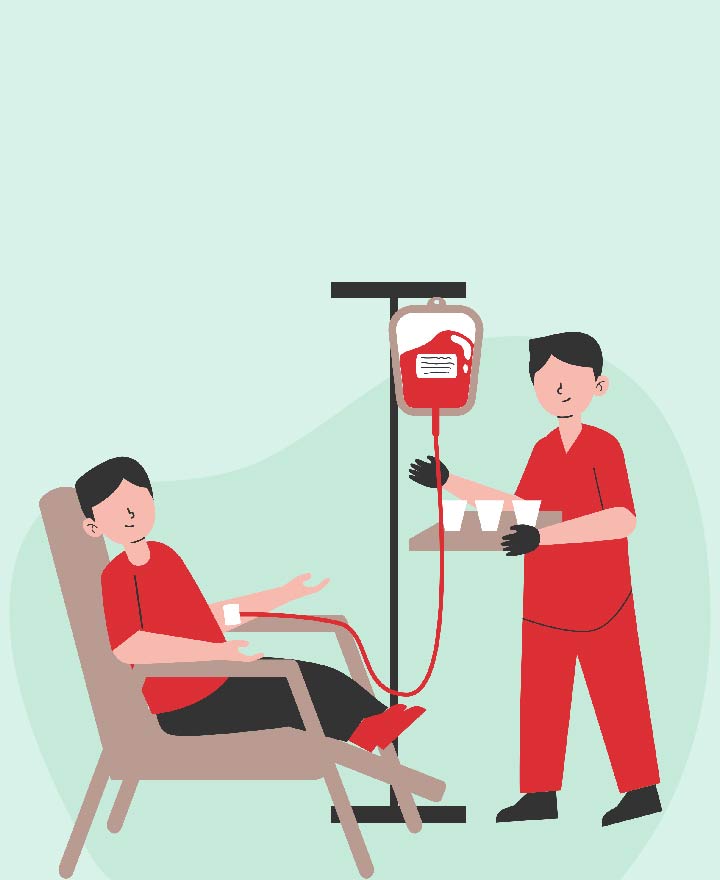

Interesting Facts of Blood Donation
Donating blood saves life. Every 14th June is celebrated as World Blood Donor Day to applaud voluntary donors who have saved numerous lives. It doesn’t just benefit recipients, but there are health benefits for donors too. Take a look at the article to know about benefits of blood donation along with some interesting facts.
Blood Donation Facts
One donation can save multiple lives. Here are the facts:
• A person can donate one unit of blood in one hour, which can be separated into 4 individual components that can help save multiple lives.
• According to the World Health Organization (WHO), India suffers from an annual deficit of 2 million blood units, as only 1% of the Indian population donates blood each year.
• There is no substitute for human blood.
• Up to 3 lives are saved by one pint of donated blood.
• More than 38,000 blood donations are needed every day.
• Red cells, platelets, plasma and cryoprecipitate are the four types of transfusable products that can be derived from blood.
• A, B, AB and O are the four main types of blood types. AB positive is the universal recipient, O negative is the universal donor.
• Donated platelets must be used within five days from the day of collection.
• Donated red blood cells must be used within 42 days from the date of collection.
• There are one billion red blood cells in two to three drops of blood.
• Blood products like plasma and cryoprecipitate are stored in a frozen state and thereby can be used for up to one year after collection.
• All donated blood products have to be screened for HIV, hepatitis B, hepatitis C and syphilis before transfusion.
• On average, a person has 10-11 units of blood; wherein one unit can be donated.
• Giving blood will not decrease your strength.
• Blood transfusions are often used for supportive care in various surgeries.
• The minimum time between whole blood donations ranges from 56 days (8 weeks) to 16 weeks. Platelet donations can be made as frequently as every eight day.
• Females receive 53 percent of blood transfusions. Males receive 47 percent.
• Healthy adults who are 16 years old and weigh at least 120 pounds are eligible to donate whole blood.
Benefits of Donating Blood
Here’s what you get when you give blood:
• Donating blood can help reveal potential health problems in the donor as before drawing blood undergoing a health screening is mandatory. This can effectively detect problems that could indicate an underlying medical condition or risk factors for certain diseases.
• Giving blood is a way to reduce the body’s extra iron stores as iron overload can cause hemochromatosis.
• Donating blood regularly may lower iron stores thereby reducing the risk of heart attack as high body iron stores are believed to increase this risk.
• Giving blood can help your liver stay healthy as it relieves the iron overload which can affect liver health.
• It can help reduce stress and improve your emotional well-being as helping someone in their time of need feels good and does wonders for your mental health.

Save your savings from unforeseen medical emergencies & hospitalization with HDFC ERGO Health Insurance
Conclusion
The health benefits of donating blood are considerable—but of course, the most important part of the process is helping to save lives. World Blood Donor Day aims to celebrate the hard work of medical professionals and to thank donors for their service and determination to save lives. Let join the effort and save lives. One of the important components of our overall wellness is also being financially secured. Healthcare emergencies can happen any time, but a good health insurance policy can protect you from such uncertain situations. To know more about it, click here.
Source: lifeservebloodcenter.org, rrvbc.org, cedars-sinai.org, MedIndia
Disclaimer: This blog provides general information and discussions about health and related subjects. The information and other content provided in this blog, website or in any linked materials are not intended and should not be considered, or used as a substitute for, medical advice, diagnosis or treatment. Kindly contact your Doctor before starting a new medicine or health regime.
Related Articles
14 easy ways to lower blood sugar levels naturally
Common blood tests done during pregnancy
Blood Donation – What should you eat before and after donating blood
5 Myths about Blood Donation – Debunked
Published on June 08, 2023

















 Health Insurance
Health Insurance  Travel Insurance
Travel Insurance  Car Insurance
Car Insurance  Cyber Insurance
Cyber Insurance  Critical Illness Insurance
Critical Illness Insurance
 Pet Insurance
Pet Insurance
 Bike/Two Wheeler Insurance
Bike/Two Wheeler Insurance  Home Insurance
Home Insurance  Third Party Vehicle Ins.
Third Party Vehicle Ins.  Tractor Insurance
Tractor Insurance  Goods Carrying Vehicle Ins.
Goods Carrying Vehicle Ins.  Passenger Carrying Vehicle Ins.
Passenger Carrying Vehicle Ins.  Compulsory Personal Accident Insurance
Compulsory Personal Accident Insurance  Travel Insurance
Travel Insurance  Rural
Rural